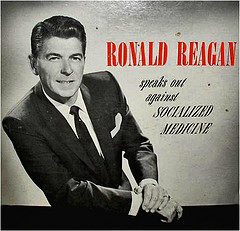In a long piece in this week’s New York Times Magazine, Peter Singer explains why American politicians’ fear of “rationing” health care is ridiculous: health care is a scarce resource, and like all scarce resources, it’s already rationed:
[T]he U.S. system also results in people going without life-saving treatment… American patients, even if they are covered by Medicare or Medicaid, often cannot afford the copayments for drugs. That’s rationing too, by ability to pay.
[…]
[E]ven in emergency rooms, people without health insurance may receive less health care than those with insurance. Joseph Doyle, a professor of economics at the Sloan School of Management at M.I.T., studied the records of people in Wisconsin who were injured in severe automobile accidents and had no choice but to go to the hospital. He estimated that those who had no health insurance received 20 percent less care and had a death rate 37 percent higher than those with health insurance. This difference held up even when those without health insurance were compared with those without automobile insurance, and with those on Medicaid — groups with whom they share some characteristics that might affect treatment. The lack of insurance seems to be what caused the greater number of deaths.
If we’re already rationing, shouldn’t we try to figure out how to do it in the fairest, most effective way possible? Singer suggests that could mean creating a system of “Medicare for All” (a plan many liberals support) that only pays for the most cost-effective treatments (as opposed to Medicare’s current setup, which pays for many of the treatments doctors choose without regard to their cost-effectiveness). Those who could afford it would be able to get private insurance, too, or pay out-of-pocket, if they wanted a procedure or medicine that had proven less cost-effective.
Of course, something like Singer’s suggestion is very unlikely to be adopted: instead, we’re apparently getting a system that expands health insurance coverage but does little to reduce costs. That’s mostly because it’s against the interests of the health care industry (and the members of Congress it bought and paid for) to actually ration care effectively. But just because it’s against the industry’s interest to ration care effectively doesn’t mean it’s not in your interest, or the country’s.











